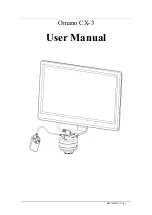
Maintenance and Troubleshooting | 6-9
To check if a
calibration gas
solenoid is stuck
open:
Verify that no drive signal is present and check for flow on the
RCU flow meter.
If flow is indicated when no solenoids are ener
-
gized, a solenoid is stuck open.
Shut off your calibration gases
(one at a time) until the flow drops to zero. This identifies the
defective solenoid valve (replace the solenoid valve, being sure
that the solenoid O-ring seals are properly positioned).
Calibration Gas
Time Inadequate
If you are having problems running an auto calibration, you
If performing a manual calibration, ensure that you are waiting for the
reading to stabilize on the display before switching to the next calibra-
tion gas. You should wait a minimum of two minutes.
AC Power Checks
Loss/Inadequate AC Voltage
to the Sensor
Measure the AC voltage to the sensor board at terminals L1
and L2. Ensure that this voltage is sufficient. Check the mea
-
surement technique used by the Volt meter (for example, RMS,
average, peak, etc.). Specifications are based on RMS mea
-
surements.
Furnace Checks
Open Furnace
Disconnect power to the control unit and the sensor. With Ohm
meter, measure across Terminals “R” and “S” on the sensor
board. The resistance of the furnace should be:
32 ohms (±10%)
If the furnace resistance is not within allowable tolerances,
replace the furnace.
Loss of AC Power
to the Furnace
If the furnace drive signal is
not present:
Verify the correct line voltage at L1 and L2 of the sensor board.
With line voltage present, check the voltage at terminals R and
s on the sensor board.
If voltage is present
and the system is
not heating, remove power and check the furnace resistance
(see “Furnace Checks” section).
If no voltage is present
at ter-
minals R and S on the sensor board, check for the DC furnace
drive signal at terminals 3 (+) and 4 (-) at the sensor board.
The furnace drive is a 15 VDc pulse train, and depending on
the frequency of the pulse train, the measured voltage will be
between 5 and 15 VDC. If this furnace drive signal is present,
reset the power to the control unit and see if this solves the
problem. If this doesn’t solve the problem, replace the sensor
board.
Check the interconnecting wiring. If the interconnecting wiring is
correct, check across FURNACE and 15V COM on the control
unit wiring card for the furnace drive signal. If the signal is not
present, check fuse F1 on the wiring card. If this fuse is OK, re
-
place the control unit power supply/keypad module. If this fuse
is not OK, replace the fuse (1/4 amp, 125 volts, IEC speed type
FF). Check the interconnecting wiring for short circuits before
applying power to the control unit.
NOTE
Summary of Contents for Thermox Series 2000 WDG-IV
Page 14: ...xiv Thermox Series 2000 WDG IV IVC IVCM This page intentionally left blank ...
Page 32: ...2 8 Thermox Series 2000 WDG IV IVC IVCM This page intentionally left blank ...
Page 59: ...Installation 3 27 Figure 3 20 Sensor connections with all sensor options ...
Page 67: ...Installation 3 35 Figure 3 24 Series 2000 2 wire RS 485 communication connections ...
Page 69: ...Installation 3 37 Figure 3 25 Series 2000 4 wire RS 485 communication connections ...
Page 72: ...3 40 Thermox Series 2000 WDG IV IVC IVCM This page intentionally left blank ...
Page 100: ...4 28 Thermox Series 2000 WDG IV IVC IVCM This page intentionally left blank ...
Page 126: ...5 26 Thermox Series 2000 WDG IV IVC IVCM This page intentionally left blank ...
Page 143: ...Service and Parts 7 3 Figure 7 1 Wiring diagram for standard sensor ...
Page 145: ...Service and Parts 7 5 Figure 7 2 Cell replacement ...
Page 155: ...7 15 Thermox Series 2000 WDG IV IVC IVCM This page intentionally left blank ...
Page 181: ...A 26 Thermox Series 2000 WDG IV I VC IVCM This page intentionally left blank ...
Page 185: ...B 4 Thermox Series 2000 WDG IV IVC IVCM This page intentionally left blank ...
Page 191: ...D 2 Thermox Series 2000 WDG IV IVC IVCM This page intentionally left blank ...
















































